27 start with W start with W

This volume examines the limits Islam, Judaism, and Christianity have set for the use of coercive violence. It probes the agreements and disagreements of these major religious traditions on pacifism (the abjurance of all force) and quietism (the avoidance of force unless certain stringent conditions are met).
The distinguished contributors examine the foundations for nonviolence in each religion, criticize the positions each religion has taken, address the inherent challenges nonviolence poses, and evaluate the difficulty of practicing nonviolence in a secular society. The concluding essay defines the common ground, isolates the points of conflict, and suggests avenues of further inquiry.
The most important contribution this volume makes is to demonstrate that no Western religious tradition provides a basis for the glorification of violence. Rather, each accepts warfare as a regretted necessity and sets strict limits on the use of force.
This work offers new insights for those interested in the ethics of warfare, peace studies, religious traditions, and international affairs.

An incisive and erudite survey of Machiavelli, the catastrophes of his times and ours, and his counsel for responding to an era of constant crises

From the author of the New York Times bestseller Begin Again, a politically astute, lyrical meditation on how ordinary people can shake off their reliance on a small group of professional politicians and assume responsibility for what it takes to achieve a more just and perfect democracy.
“Like attending a jazz concert with all of one’s favorite musicians…James Baldwin, Martin Luther King, Jr., Malcolm X, Ella Baker, Toni Morrison, and more…Glaude brilliantly takes us on an epic tour through their lives and work.”
―Henry Louis Gates, Jr., author of The Black Box: Writing the Race
We are more than the circumstances of our lives, and what we do matters. In We Are the Leaders We Have Been Looking For, one of the nation’s preeminent scholars and a New York Times bestselling author, Eddie S. Glaude Jr., makes the case that the hard work of becoming a better person should be a critical feature of Black politics. Through virtuoso interpretations of Martin Luther King, Jr., Malcolm X, and Ella Baker, Glaude shows how we have the power to be the heroes that our democracy so desperately requires.
Based on the Du Bois Lectures delivered at Harvard University, the book begins with Glaude’s unease with the Obama years. He felt then, and does even more urgently now, that the excitement around the Obama presidency constrained our politics as we turned to yet another prophet-like figure. He examines his personal history and the traditions that both shape and overwhelm his own voice.
Glaude weaves anecdotes about his evolving views on Black politics together with the writings of Ralph Waldo Emerson, John Dewey, Toni Morrison, James Baldwin, and Ralph Ellison, encouraging us to reflect on the lessons of these great thinkers and address imaginatively the challenges of our day in voices uniquely our own.
Narrated with passion and philosophical intensity, this book is a powerful reminder that if American democracy is to survive, we must step out from under the shadows of past giants to build a better society—one that derives its strength from the pew, not the pulpit.
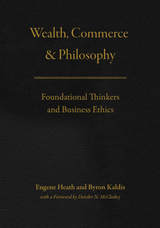
Spanning the history of western philosophy as well as looking toward classical Chinese thought and medieval Islamic philosophy, this volume provides business ethicists a unified source of clear, accurate, and compelling accounts of how the ideas of foundational thinkers—from Aristotle to Friedrich Hayek to Amartya Sen—relate to wealth, commerce, and markets. The essays illuminate perspectives that have often been ignored or forgotten, informing discussion in fresh and often unexpected ways. In doing so, the authors not only throw into relief common misunderstandings and misappropriations often endemic to business ethics but also set forth rich moments of contention as well as novel ways of approaching complex ethical problems. Ultimately, this volume provides a bedrock of moral thought that will move business ethics beyond the ever-changing opinions of headline-driven debate.

In a deeply unequal world, our economic status shapes our pursuit of virtue whether we have enough resources to live comfortably or struggle to survive
Our understanding of inequality as a moral problem is incomplete. It is not enough to say that inequality is caused by moral failing. We must also see that influence runs in both directions. Inequality harms people’s moral development.
In Wealth, Virtue, and Moral Luck, Kate Ward addresses the issue of inequality from the perspective of Christian virtue ethics, arguing that moral luck—our individual life circumstances—affects our ability to pursue virtue. Economic status functions as moral luck and impedes the ability of both the wealthy and the poor to pursue virtues such as prudence, justice, and temperance, and extreme inequality exacerbates the impact of wealth and poverty on virtue.
With these realities in mind, Ward shows how Christians and Christian communities should respond to the challenges inequality poses to virtue. Through working to change the structures that perpetuate extreme inequality—and through spiritual practices, including contentment, conversion, encountering others, and reminding ourselves of our ultimate dependence on God—Ward believes that we can create a world where all people can pursue and achieve virtue.
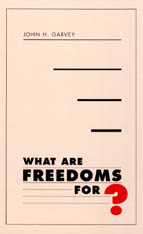
We generally suppose that it is our right to freedom which allows us to make the choices that shape our lives. The right to have an abortion is called "freedom of choice" because, it is said, a woman should be free to choose between giving birth and not doing so. Freedom of speech protects us whether we want to salute the flag or burn it. There is a correlative principle: one choice is as good as another. Freedom is not a right that makes moral judgments. It lets us do what we want.
John Garvey disputes both propositions. We should understand freedom, he maintains, as a right to act, not a right to choose; and furthermore, we should view freedom as a right to engage in actions that are good and valuable. This may seem obvious, but it inverts a central principle of liberalism--the idea that the right is prior to the good. Thus friendship is a good thing; and one reason the Constitution protects freedom of association is that it gives us the space to form friendships.
This book casts doubt on the idea that freedoms are bilateral rights that allow us to make contradictory choices: to speak or remain silent, to believe in God or to disbelieve, to abort or to give birth to a child. Garvey argues that the goodness of childbearing does not entail the goodness of abortion; and if freedom follows from the good, then freedom to do the first does not entail the freedom to do the second. Each action must have its own justification. Garvey holds that if the law is to protect freedoms, it is permissible--indeed it is necessary--to make judgments about the goodness and badness of actions.
The author's keen insights into important rights issues, communicated with verve and a variety of both real and hypothetical cases, will be of interest to all who care about the meaning of freedoms.
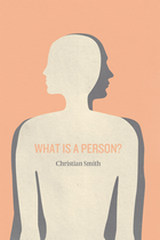
What is a person? This fundamental question is a perennial concern of philosophers and theologians. But, Christian Smith here argues, it also lies at the center of the social scientist’s quest to interpret and explain social life. In this ambitious book, Smith presents a new model for social theory that does justice to the best of our humanistic visions of people, life, and society.
Finding much current thinking on personhood to be confusing or misleading, Smith finds inspiration in critical realism and personalism. Drawing on these ideas, he constructs a theory of personhood that forges a middle path between the extremes of positivist science and relativism. Smith then builds on the work of Pierre Bourdieu, Anthony Giddens, and William Sewell to demonstrate the importance of personhood to our understanding of social structures. From there he broadens his scope to consider how we can know what is good in personal and social life and what sociology can tell us about human rights and dignity.
Innovative, critical, and constructive, What Is a Person? offers an inspiring vision of a social science committed to pursuing causal explanations, interpretive understanding, and general knowledge in the service of truth and the moral good.
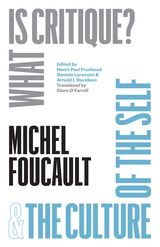
On May 27, 1978, Michel Foucault gave a lecture to the French Society of Philosophy where he redefined his entire philosophical project in light of Immanuel Kant’s 1784 text “What Is Enlightenment?” Foucault strikingly characterizes critique as the political and moral attitude consisting in the “art of not being governed like this,” one that performs the function of destabilizing power relations and creating the space for a new formation of the self within the “politics of truth.”
This volume presents the first critical edition of this crucial lecture alongside a previously unpublished lecture about the culture of the self and three public debates with Foucault at the University of California, Berkeley, in April 1983. There, for the first time, Foucault establishes a direct connection between his reflections on the Enlightenment and his analyses of Greco-Roman antiquity. However, far from suggesting a return to the ancient culture of the self, Foucault invites his audience to build a “new ethics” that bypasses the traditional references to religion, law, and science.
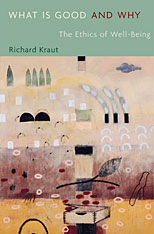
What is good? How can we know, and how important is it? In this book Richard Kraut, one of our most respected analytical philosophers, reorients these questions around the notion of what causes human beings to flourish--that is, what is good for us. Observing that we can sensibly talk about what is good for plants and animals no less than what is good for people, Kraut advocates a general principle that applies to the entire world of living things: what is good for complex organisms consists in the maturation and exercise of their natural powers.
Drawing on the insights of ancient Greek philosophy, Kraut develops this thought into a good-centered moral philosophy, an "ethics of well-being" that requires all of our efforts to do some good. Even what is good of a kind--good poems no less than good people--must be good for someone. Pleasure plays a key role in this idea of flourishing life, but Kraut opposes the current philosophical orthodoxy of well-being, which views a person's welfare as a construct of rational desires or plans, actual or ideal.
The practical upshot of Kraut's theory is that many common human pursuits--for riches, fame, domination--are in themselves worthless, while some of the familiar virtues--justice, honesty, and autonomy--are good for every human being.
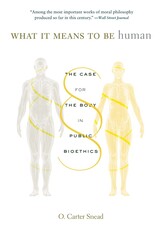
A Wall Street Journal Top Ten Book of the Year
A First Things Books for Christmas Selection
Winner of the Expanded Reason Award
“This important work of moral philosophy argues that we are, first and foremost, embodied beings, and that public policy must recognize the limits and gifts that this entails.”
—Wall Street Journal
The natural limits of the human body make us vulnerable and dependent on others. Yet law and policy concerning biomedical research and the practice of medicine frequently disregard these stubborn facts. What It Means to Be Human makes the case for a new paradigm, one that better reflects the gifts and challenges of being human.
O. Carter Snead proposes a framework for public bioethics rooted in a vision of human identity and flourishing that supports those who are profoundly vulnerable and dependent—children, the disabled, and the elderly. He addresses three complex public matters: abortion, assisted reproductive technology, and end-of-life decisions. Avoiding typical dichotomies of conservative-liberal and secular-religious, Snead recasts debates within his framework of embodiment and dependence. He concludes that if the law is built on premises that reflect our lived experience, it will provide support for the vulnerable.
“This remarkable and insightful account of contemporary public bioethics and its individualist assumptions is indispensable reading for anyone with bioethical concerns.”
—Alasdair MacIntyre, author of After Virtue
“A brilliantly insightful book about how American law has enshrined individual autonomy as the highest moral good…Highly thought-provoking.”
—Francis Fukuyama, author of Identity
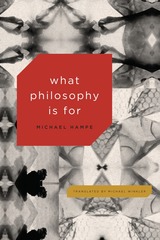
Philosophers generally develop systematic theories that lay out the basic structures of human experience, in order to teach the rest of humanity how to rightly understand our place in the world. This “scientific” approach to philosophy, Hampe argues, is too one-sided. In this magnum opus of an essay, Hampe aims to rescue philosophy from its current narrow claims of doctrine and to remind us what it is really for—to productively disillusion us into clearer thinking. Hampe takes us through twenty-five hundred years of intellectual history, starting with Socrates. That archetype of the philosophical teacher did not develop strict doctrines and rules, but rather criticized and refuted doctrines. With the Socratic method, we see the power of narration at work. Narrative and analytical disillusionment, Hampe argues, are the most helpful long-term enterprises of thought, the ones most worth preserving and developing again.
What Philosophy Is For is simultaneously an introduction, a critique, and a call to action. Hampe shows how and why philosophy became what it is today, and, crucially, shows what it could be once more, if it would only turn its back on its pretensions to dogma: a privileged space for reflecting on the human condition.

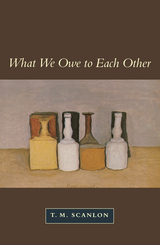
“This magnificent book…opens up a novel, arresting position on matters that have been debated for thousands of years.” —Times Literary Supplement
How do we judge whether an action is morally right or wrong? If an action is wrong, what reason does that give us not to do it? Why should we give such reasons priority over our other concerns and values? In this book, T. M. Scanlon offers new answers to these questions, as they apply to the central part of morality that concerns what we owe to each other. According to his contractualist view, thinking about right and wrong is thinking about what we do in terms that could be justified to others and that they could not reasonably reject. He shows how the special authority of conclusions about right and wrong arises from the value of being related to others in this way, and he shows how familiar moral ideas such as fairness and responsibility can be understood through their role in this process of mutual justification and criticism.
Scanlon bases his contractualism on a broader account of reasons, value, and individual well-being that challenges standard views about these crucial notions. He argues that desires do not provide us with reasons, that states of affairs are not the primary bearers of value, and that well-being is not as important for rational decision-making as it is commonly held to be. Scanlon is a pluralist about both moral and non-moral values. He argues that, taking this plurality of values into account, contractualism allows for most of the variability in moral requirements that relativists have claimed, while still accounting for the full force of our judgments of right and wrong.
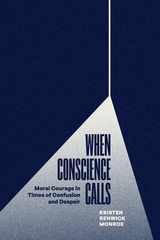
What is moral courage? Why is it important and what drives it? An argument for why we should care about moral courage and how it shapes the world around us.
War, totalitarianism, pandemics, and political repression are among the many challenges and crises that force us to consider what humane people can do when the world falls apart. When tolerance disappears, truth becomes rare, and civilized discourse is a distant ideal, why do certain individuals find the courage to speak out when most do not?
When Conscience Calls offers powerful portraits of ordinary people performing extraordinary acts—be it confronting presidents and racist mobs or simply caring for and protecting the vulnerable. Uniting these portraits is the idea that moral courage stems not from choice but from one’s identity. Ultimately, Kristen Renwick Monroe argues bravery derives from who we are, our core values, and our capacity to believe we must change the world. When Conscience Calls is a rich examination of why some citizens embrace anger, bitterness, and fearmongering while others seek common ground, fight against dogma, and stand up to hate.
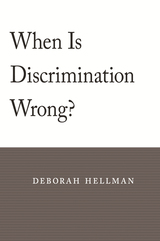
A law requires black bus passengers to sit in the back of the bus. The U.S. Food and Drug Administration approves a drug for use by black heart failure patients. A state refuses to license drivers under age 16. A company avoids hiring women between the ages of 20 and 40. We routinely draw distinctions among people on the basis of characteristics that they possess or lack. While some distinctions are benign, many are morally troubling.
In this boldly conceived book, Deborah Hellman develops a much-needed general theory of discrimination. She demonstrates that many familiar ideas about when discrimination is wrong—when it is motivated by prejudice, grounded in stereotypes, or simply departs from merit-based decision-making—won’t adequately explain our widely shared intuitions.
Hellman argues that, in the end, distinguishing among people on the basis of traits is wrong when it demeans any of the people affected. She deftly explores the question of how we determine what is in fact demeaning.
Claims of wrongful discrimination are among the most common moral claims asserted in public and private life. Yet the roots of these claims are often left unanalyzed. When Is Discrimination Wrong? explores what it means to treat people as equals and thus takes up a central problem of democracy.
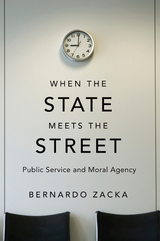
When the State Meets the Street probes the complex moral lives of street-level bureaucrats: the frontline social and welfare workers, police officers, and educators who represent government’s human face to ordinary citizens. Too often dismissed as soulless operators, these workers wield a significant margin of discretion and make decisions that profoundly affect people’s lives. Combining insights from political theory with his own ethnographic fieldwork as a receptionist in an urban antipoverty agency, Bernardo Zacka shows us firsthand the predicament in which these public servants are entangled.
Public policy consists of rules and regulations, but its implementation depends on how street-level bureaucrats interpret them and exercise discretionary judgment. These workers are expected to act as sensible moral agents in a working environment that is notoriously challenging and that conspires against them. Confronted by the pressures of everyday work, they often and unknowingly settle for one of several reductive conceptions of their responsibilities, each by itself pathological in the face of a complex, messy reality. Zacka examines the factors that contribute to this erosion of moral sensibility and what it takes to remain a balanced moral agent in such difficult conditions.
Zacka’s revisionary portrait reveals bureaucratic life as more fluid and ethically fraught than most citizens realize. It invites us to approach the political theory of the democratic state from the bottom-up, thinking not just about what policies the state should adopt but also about how it ought to interact with citizens when implementing these policies.
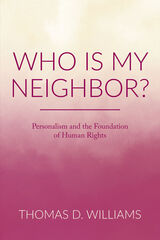
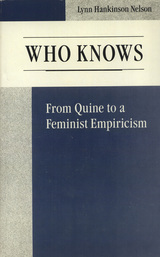
In the past fifteen years, feminist science critics have, for the most part, rejected empiricism because of its identification with positivism. Various assumptions of both empiricists and feminists, including the "tenet" that individualism is an essential element of empiricism, have led to the belief that feminist science criticism is not a part of science. This view continues the myth that science is an autonomous and apolitical activity. Building on the work of W.V.0. Quine, Lynn Nelson clears away these obstacles and establishes a framework for a much-needed dialogue between feminist science critics and other scientists and scholars about the nature of science. She makes a case for a feminist empiricism that retains a crucial role for experience, but separates empiricism from individualism.
Following Quine, Nelson argues that empiricism is a theory of evidence and is distinct from empiricist accounts of science that have been built on it. She urges feminists and empiricists to work together to develop a feminist empiricism, a view of science that can account for its obvious success in explaining and predicting experience and can encompass feminist insights into relationships among gender, politics, and science.
Basing her arguments on Quine’s non-foundationalist view that theories are bridges of our own construction, the author insists, as does Quine, that the construction of these bridges is constrained by experience. She determines that individualism is inconsistent with key Quinean positions and that empiricism can survive the demise of individualism. Clearly diverging from Quine, Nelson proposes the view that the evolving network of our theories does and should incorporate political views, including those shaped by, and shaping in turn, our experiences of gender.

One of the world’s most provocative philosophers attacks the obsession with comprehensive intellectual systems—the perceived need for a world view.
We live in a unitary cosmos created and cared for in all its details by a benevolent god. That, for centuries, was the starting point for much philosophical and religious thinking in the West. The task was to accommodate ourselves to that view and restrict ourselves to working out how the pieces fit together within a rigidly determined framework. In this collection of essays, one of our most creative contemporary philosophers explores the problems and pathologies of the habit of overly systematic thinking that we have inherited from this past.
Raymond Geuss begins by making a general case for flexible and skeptical thinking with room for doubt and unresolved complexity. He examines the ideas of two of his most influential teachers—one systematic, the other pragmatic—in light of Nietzsche’s ideas about appearance and reality. The chapters that follow concern related moral, psychological, and philosophical subjects. These include the idea that one should make one’s life a work of art, the importance of games, the concept of need, and the nature of manifestoes. Along the way, Geuss ranges widely, from ancient philosophy to modern art, with his characteristic combination of clarity, acuity, and wit.
Who Needs a World View? is a provocative and enlightening demonstration of what philosophy can achieve when it abandons its ambitions for completeness, consistency, and unity.
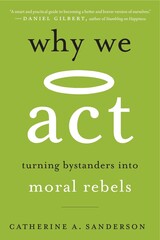
A Washington Post Book of the Year
“Makes a powerful argument for building, as early as possible, the ability to stand up for what's right in the face of peer pressure, corrupt authority, and even family apathy.”
—Psychology Today
Why do so few of us intervene when we’re needed—and what would it take to make us step up? We are bombarded every day by reports of bad behavior, from the school yard to the boardroom to the halls of Congress. It’s tempting to blame bad acts on bad people, but sometimes good people do bad things. A social psychologist who has done pioneering research on student behavior on college campuses, Catherine Sanderson points to many ways in which our faulty assumptions about what other people think can paralyze us. Moral courage, it turns out, is not innate. But you can train yourself to stand up for what you believe in, and even small acts can make a big difference. Inspiring and potentially life transforming, Why We Act reveals that while the urge to do nothing is deeply ingrained, even the most hesitant would-be bystander can learn to be a moral rebel.
“From bullying on the playground to sexual harassment in the workplace, perfectly nice people often do perfectly awful things. But why? In this thoughtful and beautifully written book, Sanderson shows how basic principles of social psychology explain such behavior—and how they can be used to change it. A smart and practical guide to becoming a better and braver version of ourselves.”
—Daniel Gilbert, author of Stumbling on Happiness
“Encouraged me to persevere through many moments when it felt far easier to stop trying.”
—Washington Post
“Points to steps all of us can take to become ‘moral rebels’ whose voices can change society for the better.”
—Walter V. Robinson, former editor of the Boston Globe’s Spotlight Team
“Sanderson offers sound advice on how we can become better at doing what we know is right.”
—George Conway, cofounder of The Lincoln Project

Scientists have long counseled against interpreting animal behavior in terms of human emotions, warning that such anthropomorphizing limits our ability to understand animals as they really are. Yet what are we to make of a female gorilla in a German zoo who spent days mourning the death of her baby? Or a wild female elephant who cared for a younger one after she was injured by a rambunctious teenage male? Or a rat who refused to push a lever for food when he saw that doing so caused another rat to be shocked? Aren’t these clear signs that animals have recognizable emotions and moral intelligence? With Wild Justice Marc Bekoff and Jessica Pierce unequivocally answer yes.
Marrying years of behavioral and cognitive research with compelling and moving anecdotes, Bekoff and Pierce reveal that animals exhibit a broad repertoire of moral behaviors, including fairness, empathy, trust, and reciprocity. Underlying these behaviors is a complex and nuanced range of emotions, backed by a high degree of intelligence and surprising behavioral flexibility. Animals, in short, are incredibly adept social beings, relying on rules of conduct to navigate intricate social networks that are essential to their survival. Ultimately, Bekoff and Pierce draw the astonishing conclusion that there is no moral gap between humans and other species: morality is an evolved trait that we unquestionably share with other social mammals.
Sure to be controversial, Wild Justice offers not just cutting-edge science, but a provocative call to rethink our relationship with—and our responsibilities toward—our fellow animals.
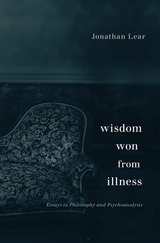
Wisdom Won from Illness brings into conversation two fields of humane inquiry—psychoanalysis and moral philosophy—that seem to have little to say to each other but which, taken together, form a basis for engaged ethical thought about how to live.
Jonathan Lear begins by looking to the ancient Greek philosophers for insight into what constitutes the life well lived. Socrates said the human psyche should be ruled by reason, and much philosophy as well as psychology hangs on what he meant. For Aristotle, reason organized and presided over the harmonious soul; a wise person is someone capable of a full, happy, and healthy existence. Freud, plumbing the depths of unconscious desires and pre-linguistic thoughts, revealed just how unharmonious the psyche could be. Attuned to the stresses of modern existence, he investigated the myriad ways people fall ill and fail to thrive. Yet he inherited from Plato and Aristotle a key insight: that the irrational part of the soul is not simply opposed to reason. It is a different manner of thinking: a creative intelligence that distorts what it seeks to understand.
Can reason absorb the psyche’s nonrational elements into a whole conception of the flourishing, fully realized human being? Without a good answer to that question, Lear says, philosophy is cut from its moorings in human life. Wisdom Won from Illness illuminates the role of literature in shaping ethical thought about nonrational aspects of the mind, offering rich readings of Shakespeare, Kierkegaard, J. M. Coetzee, Marilynne Robinson, and others.
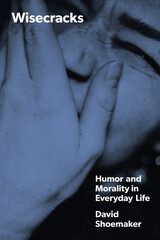
A good sense of humor is key to the good life, but a joke taken too far can get anyone into trouble. Where to draw the line is not as simple as it may seem. After all, even the most innocent quips between friends rely on deception, sarcasm, and stereotypes and often run the risk of disrespect, meanness, and harm. How do we face this dilemma without taking ourselves too seriously?
In Wisecracks, philosopher David Shoemaker examines this interplay between humor and morality and ultimately argues that even morally suspect humor is an essential part of ethical life. Shoemaker shows how improvised “wisecracks” between family and friends—unlike scripted stand-up, sketches, or serials—help us develop a critical human skill: the ability to carry on and find the funny in tragedy. In developing a new ethics of humor in defense of questionable gibes, Wisecracks offers a powerful case for humor as a healing presence in human life.
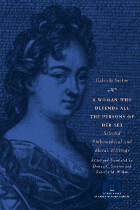
During the oppressive reign of Louis XIV, Gabrielle Suchon (1632–1703) was the most forceful female voice in France, advocating women’s freedom and self-determination, access to knowledge, and assertion of authority. This volume collects Suchon’s writing from two works—Treatise on Ethics and Politics (1693) and On the Celibate Life Freely Chosen; or, Life without Commitments (1700)—and demonstrates her to be an original philosophical and moral thinker and writer.
Suchon argues that both women and men have inherently similar intellectual, corporeal, and spiritual capacities, which entitle them equally to essentially human prerogatives, and she displays her breadth of knowledge as she harnesses evidence from biblical, classical, patristic, and contemporary secular sources to bolster her claim. Forgotten over the centuries, these writings have been gaining increasing attention from feminist historians, students of philosophy, and scholars of seventeenth-century French literature and culture. This translation, from Domna C. Stanton and Rebecca M. Wilkin, marks the first time these works will appear in English.
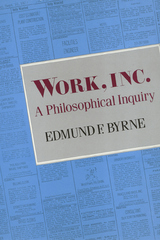
Many workers today feel that the longstanding social contract between government, business, and labor has been broken. This book examines legal and philosophical problems that must be addressed if there is to be a new social contract that is fair to workers. Drawing on a wide variety of sources, from the popular press to technical philosophy, Edmund F. Byrne brings into focus ethical issues involved in corporate decisions to reorganize, relocate, or automate. In assessing the human costs of these decisions, he shows why, to a worker, "corporations are not reducible to their assets and liabilities any more than a government is merely its annual budget. That they are organizations, that these organizations do things, and that they are socially responsible for what they do."
In support of this assignment of responsibility, Byrne seeks to demythologize corporate hegemony by confronting a variety of intellectual "dragons" that guard the gates of the status quo. These include legal assumptions about corporate personhood and commodification, private property and eminent domain; management ideas about the autonomous employee and profit without payrolls; technocratic dreams of a dehumanized workplace: ideological belief in progress and competition; and philosophical arguments for libertarian freedom, liberal welfare, and global justice.
Because of these and other mainstream perspectives, workers today are widely perceived, in law and in common parlance, to be isolated atoms. But, Byrne emphasizes, work. including work done for a transnational corporation, is done in a community. Since corporate leaders make decisions that have an impact on people’s lives and on communities, involvement in such decisions must be not only corporate or governmental but community-based as well.
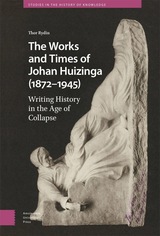
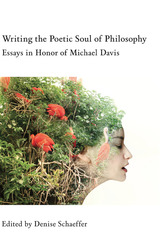
What is it about the nature of “soul” that makes it so difficult to adequately capture its complexity in a strictly discursive account? Why do some of the most profound human experiences elude our attempts to theorize them? How can a written document do justice to the dynamic activity of thinking, as opposed to merely presenting a collection of thoughts-as-artifacts? Finally, what can we learn about the activity of philosophizing, and about the human soul, by reflecting on the possibilities and limitations of writing?
These concerns, in various forms and in different registers, have preoccupied Michael Davis throughout his distinguished career. This volume is in honor of, and in dialogue with, Davis’s work, which spans ancient philosophy and literature, continental philosophy and political philosophy. It includes original essays by numerous distinguished scholars in the fields of philosophy and political science. The remarkable range and caliber of the contributions attest to the breadth and depth of Davis’s influence.
The essays in Part I of the volume explore the nature of soul through the lens of tragedy. Part II consists of three essays that explore the human longing for perfect knowledge and completion—and the obstacles to the fulfilment of that longing—in relation to the divine. In Part III, the essays address the distinctive challenges of the political sphere and philosophy’s relation to it. And while the relationship between philosophy and poetry is an implicit theme throughout the volume, the essays in Part IV focus directly on philosophy’s aestheticizing tendencies. Many different philosophical and literary works are discussed throughout these chapters, including ancient works such as Plato’s Republic, Euthydemus and Laws, Homer’s Iliad, and Euripides’ Trojan Women, as well as works by modern philosophers such as Rousseau, Kant, Hegel, Kierkegaard and Nietzsche. In addition, three essays analyze some of Shakespeare’s plays in relation to the thought of Plato and Machiavelli. All of the essays are thematically linked by a common thread as they attend to the poetic dimension of philosophical thinking.
Michael Davis is Professor of Philosophy at Sarah Lawrence College, where he has taught since 1977 and has been the Sarah Yates Exley Chair in Teaching Excellence (2003-2005). He has also taught on the graduate faculty at Fordham University and the New School for Social Research. He is the author of numerous articles and books, which include: Ancient Tragedy and the Origins of Modern Science; The Poetry of Philosophy: On Aristotle’s Poetics; The Politics of Philosophy: A Commentary on Aristotle’s Politics; The Autobiography of Philosophy; Rousseau’s The Reveries of the Solitary Walker; Wonderlust: Ruminations on Liberal Education; and The Soul of the Greeks: An Inquiry. He is also co-translator (with Seth Benardete) of Aristotle’s On Poetics.
Contributors include: Abraham Anderson, Jonathan Badger, Robert Berman, Ronna Burger, Kenneth DeLuca, Gwenda-lin Grewal, Scott Hemmenway, Paul Kirkland, Mary Nichols, Denise Schaeffer, Paul Stern, Richard Velkley, Lisa Pace Vetter, Ann Ward, Lee Ward, Catherine Zuckert and Michael Zuckert.
About the Editor: Denise Schaeffer is Professor of Political Science at the College of the Holy Cross. She is the author of Rousseau on Education, Freedom and Judgment and contributing co-editor (with Christopher Dustin) of Socratic Philosophy and Its Others. She is co-editor (with Gregory McBrayer and Mary P. Nichols) of the Focus Philosophical Library edition of Plato’s Euthydemus, for which she authored the Introduction and co-authored the Interpretive Essay.
READERS
Browse our collection.
PUBLISHERS
See BiblioVault's publisher services.
STUDENT SERVICES
Files for college accessibility offices.
UChicago Accessibility Resources
home | accessibility | search | about | contact us
BiblioVault ® 2001 - 2024
The University of Chicago Press









